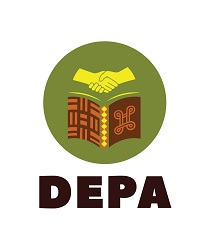Storytelling/Oral Histories - for healing, cultural survival, and change
The storytelling/ oral histories, music, and dance sessions with the Glavda speaking elders in New Kuchingoro is creating space for elders to come together and share the stories they want to keep alive. In the safe space created they share their values and knowledges of community cohesion, conflict resolution and peacebuilding, that is usually conveyed from one generation to the next through storytelling, music, and dance. The elders then participate in the transformation of these stories into educational materials working with teachers in newly created peace clubs in schools within FCT Abuja. The displaced youth and children, most of whom were either born in displacement camps, have little or no knowledge of their language and cultural identity. Given the severance from their traditional homes, there was a risk of cultural severance, which further compounded the trauma of physical displacement and violence. These oral histories were recorded in Glavda and then transcribed into Glavda and English. The elders are aged between 50 and 80. Selection was based on age as well as willingness to participate in the project.
Photovoice : Towards an Decolonial Photovoice: Psychosocial and mental health support for peacebuilding with IDP communities
Working with IDP’s (internally displaced persons) and specifically women’s groups who have highlighted the effect of displacement on their mental health and access to primary healthcare. Our approach acknowledges the legacies of colonialism, the impact of conflict and health equity in Nigeria and research systems working with vulnerable communities.
Decolonial participatory action research
Research that is conducted in and with community, not on communities (Tuck & Guishard, 2013)
In Nigeria the decolonial agenda has been to contest and explore ways of working in research partnerships and with vulnerable communities. How might the dynamics of relationships and roles between researcher and researched be rethought and reconfigured? In Nigeria the NGO partner is leading aspects of the research design and implementation and have hired a displaced Glavda speaker as research assistant from the local government area where the majority of IDPs are from. This approach has helped to address the question of equity within partnerships by addressing power asymmetries. Cross- language research and writing is essential to ensure more voices are heard.
Social economic and political transformation
The work in Nigeria continues to yield insights that illuminated the deep connection between place and tradition, and how physical displacement compounds trauma by isolating successive generations from language, cultural memory and belonging. The physical challenges of the IDP camps compounds the trauma that many of the displaced experience. Not only did they find themselves in unfamiliar surroundings, but the lack of facilities, and the poverty of residents meant that the daily struggle of living added an extra layer of hardship, on top of experiences of violence and loss.
Through the DEPA project we provide participants with a safe place to meet on a weekly basis offering health education and counselling support with our designated health worker. We have also supported the elders in New Kuchingoro with economic empowerment loans to ensure they can continue and start small enterprises within the camp environment, building their confidence and independence. Out of these ongoing sessions the elders began to share stories and memories with each other and expressed a wish to preserve and share their knowledge and advocate for themselves to highlight the conditions they face. Translation work with marginalised, traumatised, displaced populations requires linguistic skills, knowledge of the indigenous communities, knowledge of the conflict and its effects and decolonial participatory research skills to ensure the voices of the displaced and their stories are heard. However, as significantly, it refers to the uncanny and the untranslatable (Spivak 1992).

